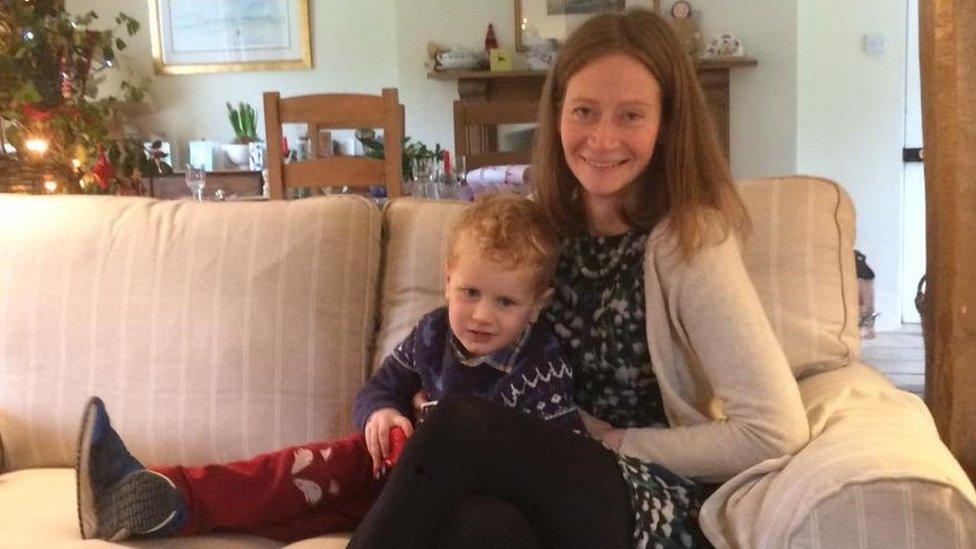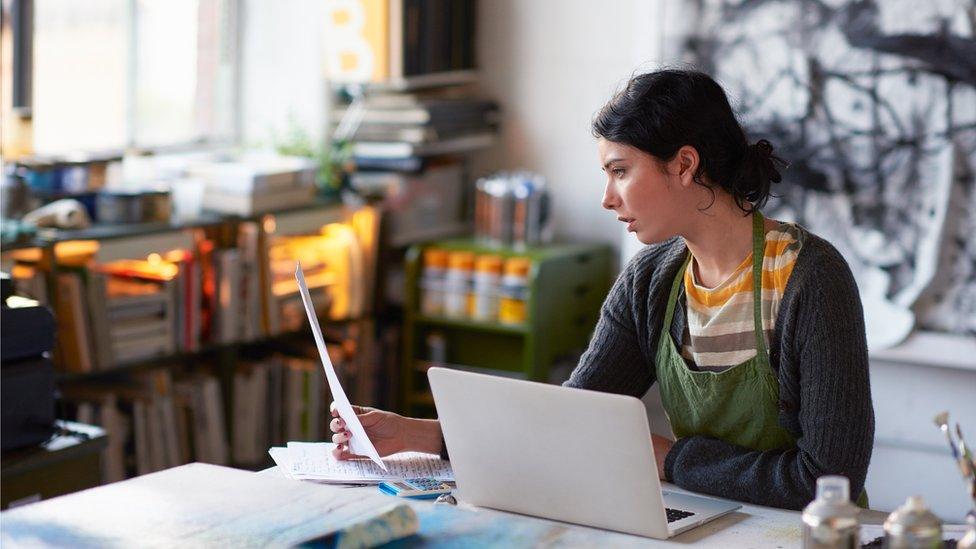Covid: Self-employed mothers 'deserve equal help'
- Published
Cheryl Liversuch and others say the SEISS discriminates against women who took maternity leave
Tens of thousands of self-employed women who have had a baby in the last few years have been discriminated against when receiving government Covid financial support, campaigners say.
The Self-Employed Income Support Scheme (SEISS) was introduced alongside the furlough scheme - for salaried employees - in March last year.
But payments are worked out based on average profits made between 2016 and 2019, meaning an estimated 75,000 women who took maternity leave during that period will lose out on a proportion of the money.
The charity Pregnant Then Screwed is bringing a judicial review for indirect sexual discrimination on Thursday.
But the government insists SEISS is "one of the most generous" schemes of its type "in the world".
Tamsin Perrett, a freelance editor in the arts world for more than a decade, gave birth to son Hugo in 2017.
She calculates she has received less than a third of the grant she would have been eligible for had she not taken maternity leave.
"It's yet another case of women's employment abilities and financial recompense being lower than men's and that's not right," Tamsin said.
She acknowledged the "risk" to incomes that self-employed people take when having a child, adding: "I'm aware this has hit everyone hard. What I am asking for is parity."

Tamsin Perrett says having a child cut the amount of government help she received by more than two-thirds
Cheryl Liversuch, a self-employed fitness instructor, had her third child in 2018 and went back to full-time work shortly before the pandemic started.
She said her SEISS grant had been equivalent to one month's full-time salary.
"My partner, his industry closed down and his income hasn't been affected by it and he had a child at the same time, so why has his [income] not been affected?" Cheryl asked. "Why is it just mine?"
Pregnant then Screwed claims the way the SEISS is calculated breaches the anti-discrimination provisions of the Human Rights Act and the requirement in the Equality Act to consider the position of women who did not work for reasons relating to pregnancy or maternity.
'Important job'
Joeli Brierley, the charity's founder, said: "This is not just about the 75,000 women. This is about hard-working, tax-paying women who are now in a financially precarious position.
"We need to remember that maternity is of critical importance to society and that for many this is physically and mentally demanding work and surely this is the most important job there is for our society.
"Helping the next generation survive and thrive is imperative work done by women."
SEISS payments are calculated by taking into account 80% of self-employed profits, averaged out between 2016 to 2019.
"Our Self Employment Income Support Scheme is one of the most generous in the world and has helped nearly three million people claim almost £20bn'', said a Treasury spokesman.
"We understand the challenges for new parents who are self-employed - and even if a new parent did not submit their tax-return for 2018-19, they may still be eligible and able to claim for a grant using their self-assessment returns from previous years."
The spokesman added that calculating the grant based on average profits over three years meant it "better reflects" people's income.
Related topics
- Published3 March 2021
